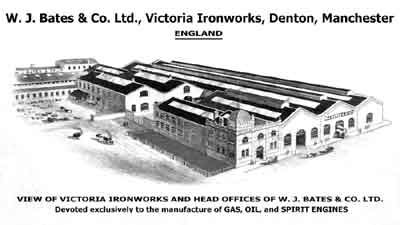W J Bates & Co Ltd, Victoria Ironworks, Saxon St, Denton
1897Walter James Bates (1873-1918) founded W J Bates & Co for the purpose of manufacturing a range of stationary engines.
His first engine design was called the ‘Bates Improved Engine’ and these were built in rented premises at Ashton-under-Lyne.
1899Walter James Bates purchased a plot of land on Saxon St, Denton, in order to build Victoria Ironworks. Here the company specialised in the manufacture of gas, oil and spirit engines.
Gas engines used coal gas (town gas) as fuel. Oil engines, also called semi-diesel or hot-bulb engines, used heavy oil as fuel. Spirit engines used petrol as fuel.
The company also manufactured paraffin engines, which were dual-fuel internal combustion engines with spark ignition designated as petrol-paraffin engines
because they were started on petrol and then switched to paraffin when warm. The grade of paraffin used was known as tractor vaporising oil (TVO).
1900W J Bates & Co Ltd was incorporated, Company No. 68649. In the same year, Knight & Hale Ltd published a book entitled, ‘Bates Oil Engines’,
which was essentially a catalogue of the engines designed by Walter James Bates.
1907The company was restructured and W J Bates & Co Ltd was incorporated, Company No. 93794. The first W J Bates & Co Ltd was then dissolved.
1908Engines designed by Walter James Bates were being built by J Knight & Hale Ltd but it is not known whether they were built at Victoria Ironworks or elsewhere.
1919Following the death of Walter James Bates, Walter Scholes Sr, a director of the National Gas Engine Co of Ashton-under-Lyne, purchased W J Bates & Co Ltd and founded Bates & Scholes Ltd.
The second W J Bates & Co Ltd was then dissolved. His son, Walter Neville Scholes Jr, was also a director of the company. Bates & Scholes Ltd was incorporated in 1919, Company No. 157001.
1920Victoria Ironworks was described as follows:
"The works are laid out for the production of small and medium power gas and oil engines and semi-diesel engines.The departments are comprised of a large pattern shop,
pattern stores, machine, erecting and testing shops,tool room, tool stores, small iron foundry, brass foundry, finishing shop, general and drawing offices, stores, etc."

1922Walter Neville Scholes Jr and Herbert Reed Hall were granted Patent GB180800, ‘Improvement in Oil Engines’.
c.1926/27J Knight & Hale Ltd acquired Victoria Ironworks from Bates & Scholes Ltd. This company referred to the premises as Vigour Ironworks as well as Victoria Ironworks.
Engine production continued much as it had done before, including the ‘Bates Improved Engine’. However, some new engine designs were introduced, such as diesel engines.
The company of Bates & Scholes Ltd was then dissolved.
1931The telephone directory for 1931 gives the address of J Knight & Hale Ltd as Saxon St, Denton.
1938J Knight & Hale Ltd was taken over by the Brush Group and the production of some engines was transferred to Petters Ltd in Loughborough.
Petters Ltd was founded in Yeovil and until 1910 it was known as James B Petter & Sons. It eventually became a subsidiary of the Brush Group.
1939Craven Brothers (Manchester) Ltd of Reddish acquired Victoria Ironworks from J Knight & Hale Ltd. This company manufactured machine tools and cranes, the latter being factory cranes and railway breakdown cranes.
This shows that J Knight & Hale Ltd remained in existence as a subsidiary company of the Brush Group.
1956Around 250 people were employed at Victoria Ironworks.
1961J Brockhouse & Co Ltd of West Bromwich acquired the Victoria Ironworks from Craven Brothers (Manchester) Ltd. This company manufactured vehicle axles and springs.
The local office of this company was at Spring Gardens, Manchester, and it was part of the Brockhouse Organisation.
1969The company of J Knight & Hale Ltd was dissolved.
1971Freehold land at Denton Works (formerly Victoria Ironworks), Saxon St, was registered by Celmac Ltd.
This notice recorded that Celmac Ltd had become the landowner of Victoria Ironworks, under the name of Denton Works, while it was still occupied by J Brockhouse & Co Ltd.
This suggests that Celmac Ltd then leased Victoria Ironworks to J Brockhouse & Co Ltd until they moved out.
1975/77J Brockhouse & Co Ltd moved out of the former Victoria Ironworks and was replaced by Robert McArd & Co Ltd/Celmac Ltd, formerly of Crown Works, off Peel St, Denton.
This company manufactured plastic toilet seats.
2002The former Victoria Ironworks and the neighbouring hat works of Booth & Moores on Hyde Rd were demolished to be replaced by a Morrison’s Superstore.
All of Russell St, Iron St and the bottom end of Inman St were also demolished. The superstore was built on the site of the ironworks and its car park was built on the sites of the hat works,
Russell St, Iron St and the end of Inman St.
2002/12Robert McArd & Co Ltd/Celmac Ltd moved to Unit 2 Fifth Avenue, Dukinfield, which is off the east side of Astley St. It became a subsidiary of Polypipe Sanitary Systems and then CME Sanitary Systems.
In 2010 CME Sanitary Systems was sold to Wirquin, a French sanitary ware group. On the 4 Oct 2011 CME Sanitary Systems announced the forthcoming closure of the Dukinfield site.
In early 2012 all operations ceased at Dukinfield and were moved to Doncaster.
2004Morrison’s Superstore opened.
The civil engineering work on the site was carried out by Cara Construction Ltd on behalf of Kier (North West), which is part of Kier Group plc.
Architects designed the building with a large glass dome to echo the dome on the Victoria Ironworks offices that stood on the corner of Saxon St and Russell St.
Terracotta plaques from the hat works of Booth & Moores were saved and incorporated in the outer walls of the superstore.
